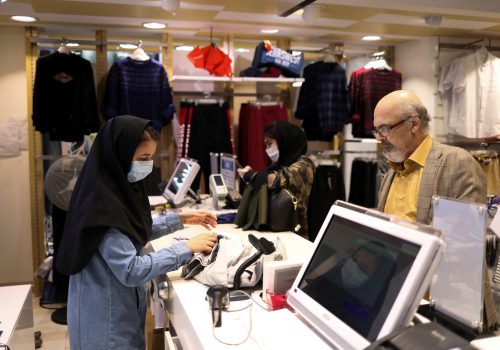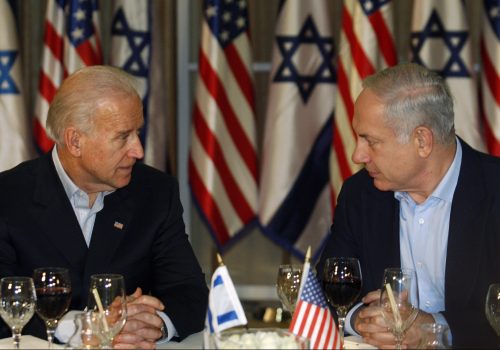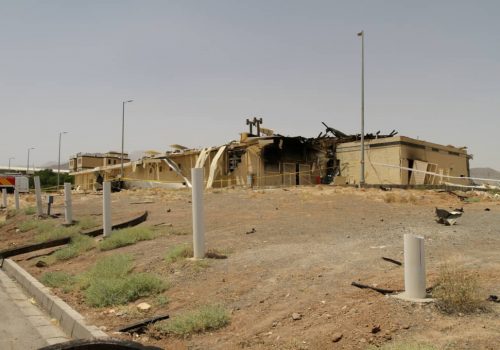The JCPOA: A bittersweet anniversary for Iran, the US and the wider world
The night was illuminated by firecrackers and punctuated with shouts of joy as if Iran had won a World Cup soccer match. Thousands poured into the streets of major Iranian cities on the night of July 14, 2015 to celebrate the conclusion of the Joint Comprehensive Plan of Action (JCPOA)—the deal trading verifiable if time-limited curbs on Iran’s nuclear activities in return for relief of economic sanctions.
In Vienna, where the agreement was reached, the mood among exhausted diplomats was one of satisfaction, not euphoria, with hope that the JCPOA would be the foundation for more diplomacy tempered by recognition of the many profound differences remaining between the Islamic Republic and its negotiating partners (Britain, China, France, Germany, Russia, and the United States).
On the American side, diplomats understood that a tough domestic political fight lay ahead and that the US Congress—then dominated by Republicans in both Houses—could still block implementation of the deal. Foreign governments—especially Israel—would work with their US friends, including members of Congress, to try to derail the JCPOA in the summer of 2015 and would continue to lobby against it even after it survived Congressional scrutiny.
Yet there was also hope that the JCPOA would prove, in the words then of Ambassador John Limbert, one of 52 Americans held hostage in Iran from 1979-81, that “there is another and more productive way to manage a relationship with a government we neither like nor trust.”
Utilizing the JCPOA as a confidence-building measure, the US and its European allies could perhaps work with the government of President Hassan Rouhani to end the wars in Syria and Yemen and promote the long-frustrated human potential of so many millions of people in the Middle East. There could be talks on missiles, even a regional security architecture, and equally important, human rights.
Instead, we are back to a US-Israeli shadow war against Iran, which restarted its nuclear program following US withdrawal from the JCPOA and re-imposition of sanctions. Tensions have flared in Iraq, where the US assassinated a senior Iranian general while Iran-backed militias have struck locations where Americans are stationed and murdered Iraqis seeking more independence from Tehran.
For the US and Iran—estranged for nearly 40 years—the JCPOA was seen as the start of a process that could have led to eventual economic and even diplomatic normalization someday. In the run-up to the deal, some members of the Iranian diaspora in the US began to organize efforts to promote investment in Iran, particularly in its promising high tech and tourism sectors. Many traveled to Iran for the first time in decades to reconnect with friends and relatives and to see for themselves how the country had evolved since the 1979 revolution. Others even moved back to be a part of what they believed would be a new era for this ancient nation.
For Iranians at large, the JCPOA was their moment to finally come out from international isolation and be seen and heard beyond the stereotypical depictions of their country in the West. Despite unemployment, inflation, and brain drain as well as political controls, many Iranians believed in Rouhani’s campaign promise of “prudent” trickle-down change.
Clearly, the election of Donald Trump in November 2016 was the biggest factor in destroying the hopes raised by the JCPOA. Trump had called the deal the “worst ever negotiated” during his campaign and after repeatedly making threats to leave the deal for a year and a half—which played a large role in hindering investment in Iran—he finally withdrew the US unilaterally in May 2018 and re-imposed ever more draconian sanctions.
Two years later, Iranians struggle not just under the weight of those sanctions, but mismanagement, corruption, and the coronavirus pandemic. While some may place hopes on a new administration in the US, it’s worth noting that there were other factors that undermined the JCPOA from the start—factors that need to be recognized and dealt with if US-Iran diplomacy is to be successfully revived.
Future sanctions relief should ideally be legislated, not implemented through executive orders that can be reversed whenever there is a new occupant of the Oval Office. That means that a US administration must make a convincing case to the American people and their representatives that a deal is truly in US national interests.
The US needs to work with its allies—particularly the Europeans, South Korea and Japan—to formulate a strategy that has broader international buy-in than the Trump administration’s policy of “maximum pressure.” Unilateralism hasn’t and will not work to bend Iran to Washington’s will.
The US needs to recognize that Iran—whether Americans like it or not—has legitimate security concerns. The Trump administration effort to isolate Iran and to crush its economy has hurt not only ordinary Iranians but turned the Middle East into an even deeper zone of dysfunction. Lebanon’s currency and economy have collapsed, Syria and Yemen are failed states and Iraq is struggling to survive amidst tension between its two most powerful patrons. The [Persian] Gulf Cooperation Council is also a mess, riven by the Emirati and Saudi vendetta against Qatar, which President Trump initially encouraged. All at a time when the coronavirus is killing its way through the world with no regard for ideology, religion or the size of military budgets.
From the Iranian side, meanwhile, there needs to be a genuine movement for peace with the US, the region and most especially, the Iranian people. Fewer threats from the Trump administration, Israel and Saudi Arabia would be useful, but the leaders of the Islamic Republic know that many of their failures are the product of their own corrupt efforts to enrich themselves and their followers and to cling to power. In addition, the continued snatching of dual and foreign nationals as hostages and the criminalization of civil society are enduring stains on the Iranian system—as well as the continuous calls to destroy Israel from various Iranian officials.
The temptation for Iran to look east has long been present—as shown by recent discussions over a controversial 25-year “strategic accord” with Beijing—and has been bolstered by US sanctions. Most Iranians, however, still identify more with Europe and the United States than with China. It should also be recalled that the desire for strategic independence was one of the main reasons for the 1979 revolution.
The next US and Iranian governments will face many challenges, not least recovery from COVID-19 and economic recession. But whoever wins the presidential election in the US in November and in Iran next year must also address a conflict that has hurt both countries, the region and the wider world.
Barbara Slavin is director of the Future of Iran Initiative at the Atlantic Council. Follow her on Twitter: @BarbaraSlavin1.
Holly Dagres is editor of the Atlantic Council’s IranSource blog, and a nonresident fellow with the Middle East Programs. She also curates The Iranist newsletter. Follow her on Twitter: @hdagres.
Image: US Secretary of State John Kerry attends a plenary session at the United Nations building in Vienna, Austria July 14, 2015. Iran and six major world powers reached a nuclear deal on Tuesday, capping more than a decade of on-off negotiations with an agreement that could potentially transform the Middle East, and which Israel called an "historic surrender". REUTERS/Leonhard Foeger


